Updated May 2023: You may have hundreds of non-rev flights under your belt, but are you maximizing your travel perks after you have arrived at your destination? Many standby travelers are leaving money on the table by missing out on huge cash-saving opportunities during their non-rev adventures. Accumulating credit card travel rewards is the perfect way to supplement your travels and stretch your travel budget even further. Here is a list of the best credit cards currently available for nonrevs.
Support for this site comes from our readers, and this post contains affiliate links for products we believe in. Using the affiliate links below helps the Standby With Me team create useful content for travelers like you.
What are credit card travel rewards?
Put simply, travel rewards are the currency of loyalty programs. These programs encompass the credit card points, airline miles, and hotel rewards that you accumulate through credit card sign-up bonuses & organic spending.
Why should I collect credit card loyalty points?
Building up a bank of miles or points is a great way to offset your travel expenses, and taking advantage of lucrative credit card signup bonuses are the best way to supercharge your rewards account. I have redeemed my credit card points at properties around the globe including Hawaiian resorts, waterfront hotels in Belize, and even for a two-story room in Salzburg’s oldest inn.
If you aren’t sure how to value each hotel loyalty programs’ points, I created a quick reference guide for hotel point valuations.
How do I find the best credit card to sign up for?
You have come to the right place! I have been travel hacking & churning credit cards for years. I have signed up for 20+ credit cards since I started flying around the world, so I will share my experience below to help any other traveler who wants to get started with travel hacking.
Wait, isn’t signing up for a lot of credit cards bad for your credit score?
Good question! I recommend starting off slow as you learn how to identify the best sign-up bonuses for your style of travel, but I have maintained a 750+ credit score throughout years of travel hacking by following these four basic rules:
- Never carry a balance
- Set up auto-pay on your account so you are never late on a payment
- Space out your credit card applications so you have no issues with hitting the required spend amount to unlock the signup bonus
- Avoid canceling cards (most premium travel cards with annual fees can be downgraded to a no annual fee credit card once you receive your signup bonus)
Premium Travel Credit Card Recommendations For Nonrevs
We generally recommend that non-revs forgo all airline credit cards in favor of credit cards that allow you to use your points on hotels & lodging. Below is a list of our favorite cards and how we utilize them. Many of us enjoy traveling internationally, so we recommend that all non-revs have at least one card that has no foreign transaction fees to avoid paying unnecessary fees.
Best Overall Credit Card: Capital One Venture X

| Pros | Cons |
| + 75,000 mile signup bonus ($750 value) | – $4,000 minimum spend in first 3 months is higher than some cards |
| + 10,000 mile annual anniversary bonus | – Relatively low earnings rate |
| + Lounge access for cardholder(s) and two guests | – Airline & hotel transfer partners won’t be very valuable to US-based nonrevs |
| + $300 travel statement credit | |
| + TSA Pre/Global Entry credit (worth up to $100 every 4 years) | |
| + Primary auto rental collision damage insurance (most cards only offer secondary coverage) | |
| + No foreign transaction fees | |
| + Virtual card number available through the Capital One app |
After years of loyalty to Chase’s suite of travel credit cards, Capital One finally released a premium travel card that rivals more its more established peers. As a non-rev traveler, the Venture X offers the best bang-for-your-buck among the highest tier of cards (you can find my in-depth review of this card by clicking here).
Beyond the various travel credits offered by this card, it is has the lowest annual fee among cards that offer a complimentary Priority Pass Select membership (not to mention Capital One’s small-but-growing network of their own lounges).
While Capital One’s transfer partners are mostly airlines (and therefore less valuable for nonrevs), they can easily be converted into statement credits to wipe out any transactions that coded as “travel” in the past 90 days.
Highest Earning Credit Card: Chase Sapphire Reserve
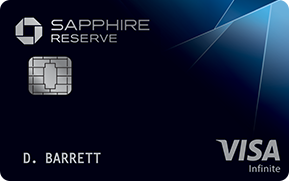
| Pros | Cons |
| + 60,000 UR points signup bonus ($900+ value) | – $4,000 minimum spend in first 3 months is higher than some cards |
| + Valuable bonus reward categories | – $550 annual fee |
| + Lounge access for cardholder(s) and two guests | |
| + $300 travel statement credit | |
| + TSA Pre/Global Entry credit (worth up to $100 every 4 years) | |
| + Primary auto rental collision damage insurance (most cards only offer secondary coverage) | |
| + No foreign transaction fees | |
| + $10 monthly GoPuff credit |
I signed up for the Chase Sapphire Reserve as soon as it was announced in 2016 (along with its introductory 100,000 point signup bonus) and have not looked back since. The signup bonus has since been reduced to 60,000, but that still represents a lot of value for non-rev travelers. 60,000 UR points can be redeemed for $900 through Chase’s travel portal (valued at 1.5 cents-per-point with the Sapphire Reserve) or transferred to one of Chase’s 13 airline & hotel transfer partners.
Since most non-revs have little need for transferring their points to airlines loyalty programs, the Chase hotel partners include Hyatt, Marriott, and IHG. Additionally, you will earn 10x points on Lyft rides and 3x points on travel & dining.
In addition to the signup bonus and above-average earnings rate, the real value comes in the form of additional perks that Chase tacks onto this card.
Big Credit Card Sign-Up Bonuses For Non-Rev Travelers
Not everyone travels enough to justify the high annual fees associated with a premium travel credit card. Luckily, there are a number of other great options for non-rev travelers that let you enhance your travel experience without an eye-popping price tag.
Check out the list below of travel credit card options that are available for under $100/year.
Chase Sapphire Preferred

| Pros | Cons |
| + 60,000 UR point signup bonus ($750+ value) | – $4,000 minimum spend in first 3 months is higher than some cards |
| + Valuable bonus reward categories | – $95 annual fee |
| + 10% anniversary bonus points | |
| + Complimentary 6-month Instacart+ membership | |
| + Primary auto rental collision damage insurance (most cards only offer secondary coverage) | |
| + No foreign transaction fees |
The Chase Sapphire Preferred is the proverbial gateway drug when it comes to travel hacking, and that’s for many good reasons. The 80,000-point signup bonus is now higher than the more premium Chase Sapphire Reserve card while having a lower annual fee. Plus, it still gives you access to the same network of Chase’s Ultimate Rewards hotel transfer partners like Hyatt, Marriott, and IHG.
If the Sapphire Reserve’s $550 annual fee is too big of a pill to swallow, you will be hard-pressed to find a better alternative than the Chase Sapphire Preferred.
CapitalOne Venture Card
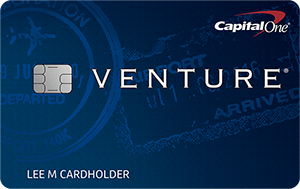
| Pros | Cons |
| + 75,000-mile signup bonus ($750 value) | – $4,000 minimum spend in first 3 months is higher than some cards |
| + TSA Pre/Global Entry credit (worth up to $100 every 4 years) | – $95 annual fee |
| + No foreign transaction fees | – Long-term value diminishes after the 1st year |
The CapitalOne Venture credit card is as simple as it gets when it comes to travel rewards: earn 2x points on all purchases and redeem your points as travel statements against posted charges. The 75,000 signup bonus (worth $750 when redeemed against travel charges) only requires a $4,000 minimum spend, so there is a lot of upfront value in this card even with the $95 annual fee.
This is my #1 credit card recommendation to anyone who is thinking about applying for Global Entry. Instead of spending $100 on the GE application, why not spend $95 on this card to receive a complimentary application and 75k miles?
Pro tip: Consider downgrading this card to the $0 annual fee Capital One VentureOne card (with $0 foreign transaction fees) after your first 12 months to avoid paying the $95 annual fee.
Editor’s Note: In November 2021, Capital One released a premium version of this card (called the Venture X) that offers cardholders airport lounge access
Chase IHG Rewards Club Premier Credit Card
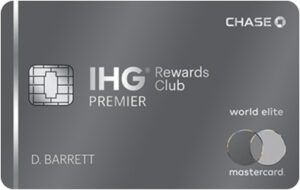
| Pros | Cons |
| + 4-free nights signup bonus (up to $800 value) | – $89 annual fee (not waived first year) |
| + Complimentary IHG Platinum Elite status | – Subpar earnings rate |
| + Complimentary anniversary reward night (worth up to 40k points) | |
| + TSA Pre/Global Entry credit (worth up to $100 every 4 years) | |
| + No foreign transaction fees |
Do you find yourself frequently staying at Holiday Inn or other IHG properties? If so, I have been a happy IHG credit card holder for many years.
On top of the sign-up bonus, complimentary IHG Platinum Elite status ensures that you have access to a higher points-earning rate, complimentary room upgrades, and extended check-out privileges when you stay at an IHG property. With IHG’s enormous global footprint, you will find an IHG property virtually anywhere you travel.
Additionally, you will earn a free certificate for one night stay at any IHG hotel (redemption value of up to 40,000 points) upon renewal of your card, which means this card has residual value beyond the first year of card ownership.
Chase World of Hyatt Credit Card
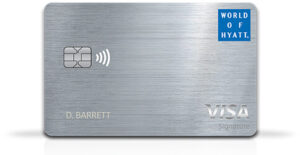
| Pros | Cons |
| + 60,000 Hyatt point signup bonus ($1,000+ value) | – $95 annual fee |
| + Complimentary World of Hyatt Discoverist status | – The full 60k bonus requires $15k spend over 6 months |
| + Complimentary anniversary reward night | |
| + No foreign transaction fees |
This is my personal favorite co-branded hotel credit card option currently available. One Hyatt point is worth double or triple what other hotel loyalty points are worth; Hyatt hotel redemptions start as low as 5,000 points per night for their Category 1 properties. This means the current card’s 60,000 point signup bonus could be worth up to 12 nights at Hyatt properties (which represents a massive value to budget-conscious nonrevs).
Additionally, you will earn a free certificate for one night stay at any Category 1-4 Hyatt property upon renewal of your card. This means the Chase World of Hyatt Credit Card retains long-term value beyond the signup bonus. I haven’t swiped this card for any purchases in years, but I keep the Hyatt card in my wallet solely for the annual free night certificate.
Hilton Honors American Express Surpass Card
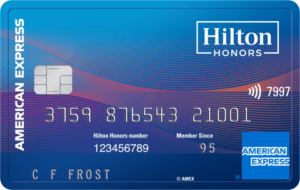
| Pros | Cons |
| + 150,000 Hilton point signup bonus ($450+ value) | – $95 annual fee |
| + Complimentary Hilton Honors Gold status | – Subpar earnings rate |
| + Lounge access for cardholder(s) and two guests | – No complimentary anniversary stay reward |
| + No foreign transaction fees |
Hilton has a large & diverse portfolio of hotels around the globe, so having this card in your wallet affords you plenty of lodging options while traveling. In addition to the large signup bonus, Amex’s Surpass card provides cardholders with 10 Priority Pass lounge visits via the complimentary Priority Pass Select membership. This is a great option for low-volume travlers who want lounge access but cannot justify a higher annual fee for unlimited lounge visits.
Pro tip: Amex offers a $0 annual fee version of this card if you want to downgrade after earning the sign-up bonus & avoid paying future annual fees.
Marriott Bonvoy Boundless Credit Card
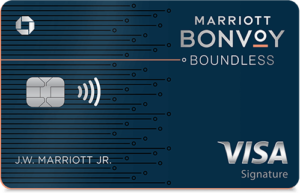
| Pros | Cons |
| + 3 free hotel night certificates (up to 50,000 points per night) | – $95 annual fee |
| + Complimentary Marriott Bonvoy Silver status | – Subpar earnings rate |
| + Complimentary anniversary reward night | |
| + No foreign transaction fees |
Rounding out the major hotel chain offerings is Chase’s Marriott Bonvoy Boundless card. Marriott & Starwood merged years ago to form the expanded Bonvoy portfolio of hotels, and they have a huge range of properties that can satisfy every type of traveler.
The one drawback here is that the Bonvoy Boundless card is currently offering night certificates (worth up to 50k points/night) instead of straight up points as part of the sign-up bonus. This is great if you have your eyes set on specific Marriott properties in the 40-50k/night range, but budget travelers will not be able to maximize this bonus if you often book Marriott’s lower-range properties.
It is worth mentioning that Chase has bumped up the sign-up bonus from 3 night certificates to 5 night certificates, so keep an eye out for increased bonuses.
Pro tip: Chase offers a $0 annual fee version of this card (Marriott Bonvoy Bold) if you want to downgrade & avoid paying future annual fees.
Credit Cards That Nonrevs Should Avoid
American Express Platinum Card
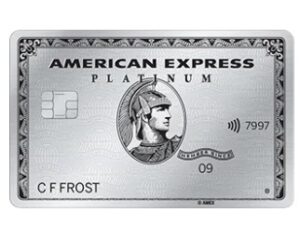
The Platinum Card from American Express is a commonly recommended credit card for frequent flyers who want to take advantage of the extravagant Centurion Lounges. As a former cardholder, I can confirm that the Centurion Lounge is a great experience.
However, there is a major drawback that all nonrevs need to understand: a boarding pass with a confirmed seat is required for admission to the Centurion Lounge. American Express has doubled down on this stance and explicitly prohibits the admission on non-revs & standby passengers without confirmed seat assignments per the below policy:
Note: The Centurion Lounge is a Day of Departure lounge requiring confirmed travel plans. Passengers holding standby tickets and non-revenue standby passengers, including airline or industry employees traveling on discounted tickets, are not eligible to utilize the lounge unless they have received a boarding pass showing a confirmed seat or zone assignment for the flight for which they are on standby.
For any nonrev thinking they can skirt this restriction by presenting your confirmed seat assignment upon arrival at an airport with a Centurion Lounge, American Express has added language to their Centurion Lounge access policy limiting admission to departing passengers only (trust me, I tried).
The American Express Platinum Card unlocks the highest-tier of domestic US lounges and can be a great addition to the wallet of any frequent flyer. Unfortunately, the Centurion Lounge is all but off-limits to non-rev passengers flying on standby tickets.
Final Thoughts
So there you have it. This is our list of recommended options for non-revs who are just getting started with travel hacking or are looking for the next card to add to their wallet.
Did you see your favorite card on the list or did we miss it? Feel free to share your thoughts or questions in the comments below!





Pingback: Why Nonrevs Shouldn’t Apply For The American Express Platinum Card (unless you're a Delta employee)
Pingback: How to travel the world using non-rev travel benefits
Pingback: Small-town Charm Near CLT Airport: Discovering Gaston County & Cleveland County
Pingback: How To Travel On A Budget: Tips from a Nonrev
Pingback: 12 Things I Wish I Knew Before My First Non-Rev Flight
Pingback: 13 Apps Every Non-Rev Needs On Their Phone
Pingback: Non-Rev Destinations: A Day Trip to Minneapolis (MSP)
Pingback: 10 Mistakes Every Non-Rev Traveler Makes (And How You Can Avoid Them)
Pingback: 4 Travel Podcast Recommendations for Nonrevs
Pingback: TSA PreCheck & CLEAR locations at DFW International Airport
This article is a exactly what I was looking for! Thanks!!! One question about the section regarding Capital One venture x card. Can you clarify what you mean by… “they can easily be converted into statement credits to wipe out any transactions that coded as “travel” in the past 90 days.”
Pingback: Discover's 5% Cashback Bonus Calendar (2023)
Pingback: How much are hotel points worth? (May 2023)
Pingback: Seated app review: Is it too good to be true? (2023 update)
Pingback: Chase's 5% Cashback Bonus Calendar (2023)
Pingback: Chase's 5% Cashback Bonus Calendar (2024)
Pingback: Discover's 5% Cashback Bonus Calendar (2024)
Pingback: Discover's 5% Cashback Bonus Calendar (2025)
Pingback: Chase's 5% Cash Back Bonus Calendar (2025)